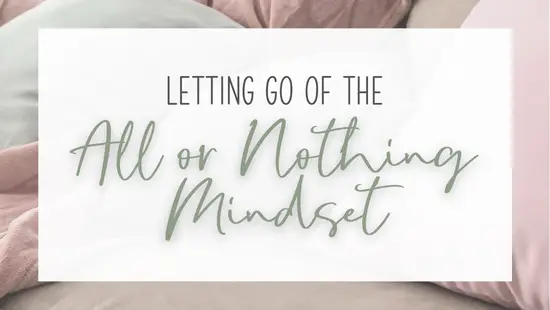
Note - Affiliate links may be used in this post, including Amazon affiliate links. I may receive a small commission at no extra cost to you if you use my affiliate link. But don't worry, all the opinions expressed are my own!
Letting Go of the All or Nothing Mindset
It’s so easy to get caught up in the all-or-nothing mindset. We want things to be perfect, so we either go all-in or give up completely.
But what if there was another way? What if we could let go of the need for perfection and instead embrace a more flexible way of thinking? When we’re open to different possibilities, we open ourselves up to a whole world of opportunity. We can try new things without the pressure of having to be perfect. We can enjoy the process instead of fixating on the end result. And ultimately, we can find more joy and satisfaction in our lives. Read on to learn more about all-or-nothing thinking and how you can let it go to benefit your life.
What is all-or-nothing thinking?
Have you ever tried to start a new habit, and when you missed a day, you just…stopped? Or felt like now you have to start over from the beginning? Or maybe you’ve been working hard towards a goal, and when you had a setback, you felt like giving up entirely. If so, then you’re familiar with all-or-nothing thinking.
This type of thinking is a black-and-white way of looking at things. We see things as absolute: 100% or 0%, good or bad, black or white, success or failure. There’s no middle ground, no room for error.
It’s actually a type of cognitive distortion, which means it’s a way of thinking that’s inaccurate and negatively impacts our lives. Cognitive distortion is just a way of saying our thought patterns are a little screwy.
So why do we do it? Well, all-or-nothing thinking is often a defense mechanism. It’s a way to protect ourselves from feelings of failure, disappointment, and inadequacy. If we go all-or-nothing, then we can’t fail…right?
Wrong. All or nothing thinking is actually a recipe for disaster. It sets us up for anxiety, disappointment, and discouragement because it’s simply not realistic. It’s not great for our mental health. And it can prevent us from trying new things or reaching our goals because we’re afraid of not being perfect.
This way of thinking can actually be helpful in some situations. For example, if you’re studying for an exam, you might want to give it your all to get the best grade possible. But in other cases, all or nothing thinking can be harmful.
When we’re too rigid in our thinking, we set ourselves up for disappointment. We put all our eggs in one basket, and if things don’t go according to plan, we feel like a failure. This can lead to negative self-talk, low self-esteem, and even depression.
What does an all-or-nothing mindset look like?
Here are some common examples of all-or-nothing thinking:
- I’m on day 21 of an exercise program, but I missed day 22. Now I have to start over from day 1
- I was doing so well with my diet, but I had one cheat meal, and now I might as well give up entirely
- I’ve been working hard on my project, but I’m not seeing any results yet. It’s probably time to give up
If you relate to any of these examples, then you know what it’s like to be stuck in an all-or-nothing mindset.
An all-or-nothing mindset is a form of perfectionism, and it’s something that we all struggle with from time to time. The problem is when we get too comfortable with this way of thinking, it starts to impact our lives negatively.
All or nothing thinking is often the result of having high standards. There’s nothing wrong with wanting to do your best, but when our standards are too high (to the point of being impossible), we’re setting ourselves up for disappointment.
How all-or-nothing thinking affects our lives
All-or-nothing thinking can impact different areas of our lives in different ways. Here are some examples:
- Health and fitness: We want to be healthy and fit, so we either go all out with a strict diet and workout regimen, or we do nothing at all. We miss a day of working out and believe we have to start all over again from the beginning. Or we eat one unhealthy meal and feel like we’ve blown our diet, so we might as well give up entirely.
- Career: We want to find a successful career, so we either go all-in and work 80 hours a week or we do nothing at all. We have one bad day at work and feel like we’re a failure. Or we don’t get the promotion we wanted, so we feel like giving up entirely.
- Relationships: We want to find a meaningful relationship, so we either go all-out looking for love, or we do nothing at all. We have one bad date and decide we’ll never find love. Or we don’t get asked out as much as we want, so we give up on dating entirely.
As you can see, all-or-nothing thinking can harm our health, job performance, and relationships.
Other ways an all-or-nothing mindset can affect you
If you’re stuck in an all-or-nothing mindset, it can impact your life in several ways.
You miss out on opportunities
When you’re only focused on the end result, you miss out on all of the good that’s happening along the way.
You might be so focused on getting to your goal weight that you don’t enjoy the process of getting there. Or you might be so focused on getting that perfect grade that you miss out on all of the learning and growth that’s happening along the way.
You’re never satisfied
It’s hard to find satisfaction when you’re constantly striving for perfection. You might be able to reach your goal, but you’ll never be able to meet the expectations you’ve created for yourself.
You put unnecessary pressure on yourself
The all-or-nothing mindset often leads to self-imposed pressure. We put so much pressure on ourselves to be perfect that we end up feeling stressed and overwhelmed.
You miss out on the joy of imperfection
When you’re focused on being perfect, you miss out on the beauty of imperfection. You might be so focused on getting things right that you don’t even give yourself permission to make mistakes and learn.
You have a hard time enjoying the present moment
It’s hard to be present when you’re always living in the future. So when you’re constantly striving for perfection, you miss out on all of the good that’s happening right now.
You miss out on small wins
The all-or-nothing mindset can also lead to a feeling of defeat when we don’t reach our goals. We fixate on the end result and forget to celebrate the small wins along the way.
You become your own worst critic
If your goal is always “perfect,” you’re likely to be your own worst critic. You might be so critical of yourself that you miss out on all your good qualities.
You get discouraged easily
When you have an all-or-nothing attitude, it’s easy to get discouraged. If you don’t reach your goals, you might feel like a failure and give up entirely.
You have a hard time taking risks
Taking risks is hard when the only options are success or failure. You might be so afraid of failing that you miss out on opportunities for growth.
You’re never truly happy
It’s hard to find true happiness when you’re living in an all-or-nothing mindset. You might be able to achieve your goals, but you’ll always be left wanting more.
We all struggle with the all-or-nothing mindset from time to time, but it’s important to remember that it doesn’t have to control our lives. There are ways to overcome this way of negative thinking and start living a more balanced life.
How to shift from “all-or-nothing” to “some is better than none”
If it’s time to move past the all-or-nothing mindset, here are some tips to get you started:
Acknowledge your all-or-nothing thinking
The first step is to become aware of your all-or-nothing thinking. When you’re able to recognize when you’re falling into this way of thinking, you can start to make a conscious effort to shift your perspective. Notice when you’re fixating on the end result of putting pressure on yourself to be perfect.
Challenge your all-or-nothing thinking
Once you’ve identified your all-or-nothing thoughts, it’s time to start challenging them. Ask yourself if there’s another way to look at the situation.
For example – you’re trying to lose weight and miss a workout, you might be tempted to think, “I’m never going to reach my goal weight.” But instead of beating yourself up, try to see the situation in a more positive light. Maybe you can think, “I missed a workout, but that doesn’t mean I’m never going to reach my goal weight.”
Practice self-compassion
If you’re going to challenge your all-or-nothing thought patterns, it’s important to practice self-compassion. Be gentle with yourself when you make mistakes, and remind yourself that everyone makes them.
Focus on progress, not perfection
When you’re working towards a goal, it’s important to focus on your progress, not on perfection. Celebrate the small wins, and remember that every step you take is moving you closer to your goal.
For example, working out two days a week is better than zero, and eating healthy 80% of the time is better than none of the time. So celebrate the small steps forward!
Give yourself permission to make mistakes
To achieve something great, you have to be willing to make mistakes. So give yourself permission to screw up from time to time. It’s all part of the learning process!
Live in the present moment
One of the best ways to break free from all-or-nothing thinking is to live in the present moment. When you can focus on what’s happening right now, you’re less likely to worry about what could go wrong in the future.
Be mindful of your self-talk
Your self-talk has a significant impact on your all-or-nothing thinking. So it’s important to be aware of the things you’re saying to yourself. If you find yourself being too critical, try to reframe your thoughts in a more positive light.
Find beauty in imperfections.
When you’re able to find beauty in the imperfections, you’ll be able to let go of all or nothing thinking. Appreciate those imperfections and learn to love them as they are.
Celebrate your accomplishments
Celebrating your accomplishments, no matter how small they may be, is essential. This will help you to see all of the progress that you’re making.
Give yourself permission to make mistakes
Making mistakes is a part of life, and it’s important to give yourself permission to make them. Don’t be so hard on yourself when you make a mistake. Just learn from it and move on.
One last tip:
Don’t go in “all-or-nothing” on changing your mindset. Do one thing at a time and be patient with yourself. It takes time to change the way you think, but it’s worth it!
Final Thoughts
We all fall into the all-or-nothing mindset from time to time. But it’s important to break free from this way of thinking if you want to live a more balanced and fulfilling life. You’re ready to make a change. So, use these tips to help you get started. And remember, be patient with yourself and don’t be afraid to make mistakes. You’ve got this!




